A taste of Palestine: a story they wouldn't run
I share my trip to the West Bank that was 'too political' for some media outlets, and a recipe that speaks of a bulldozed home, rebuilt.
Welcome to my inaugural newsletter! This is longer than most newsletters that will follow, because I think it deserves to be. I hope you enjoy reading it (although ‘enjoy’ probably won’t be the right word). For the time being, my dispatches will be free. But I’d love you to consider a paid subscription, as they take a great deal of time to research and write. To become a free subscriber or upgrade to paid, just click below.
Late last year, after my youngest left home for university, feeling a bit redundant, sad and empty nest-ish, I booked a trip to Palestine. I’d visited years ago as a foreign correspondent for an Australian newspaper. But this trip was different. Organised by the Amos Trust, a human rights organisation, I would spend ten days exploring the challenges facing Palestinians living in the West Bank, through the lens of food.
I guess I expected a kind of Ottolenghi-style tour, a pomegranate-seed strewn food odyssey with a bit of politics thrown in. Naïve, ignorant, stupid me. Nothing could have prepared me for the mind-blowing gut-wrenching tragedy that is happening in this region.
Before setting off, I offered to write a feature about the trip for several media outlets, optimistic that the palatable food focus would appeal to one of them. But no. It was ‘a bit too political’ I was told. Just the term ‘Palestine’ was controversial.
It is, of course, impossible to talk about the food of Palestine without acknowledging the politics. Israel has occupied the West Bank since 1967 and the daily lives of Palestinians are profoundly impacted by Israeli restrictions. The Mediterranean and the Dead Sea are off limits to many, and the rapid encroachment of illegal settlements on Palestinian land creates enormous hardships and indignities.
To be honest, I didn’t know how to write this. The Palestinian situation is complex, of course, but it’s more than that. The people we met, who welcomed us with warmth and generosity, all deserve to have their voices heard. Many are convinced the world doesn’t care about them, and that knowledge is worse, some say, than living under Israeli occupation. In the end, I decided that the best way to tell their story was through their food1.
Maklouba
Lara and her daughters Lana, 13 and Amal, 10 are teaching us how to cook maklouba in the tiny kitchen of their apartment in Aida Refugee Camp, near Bethlehem. In my ignorance I’d expected a tent city – it is, after all, a refugee camp. Aida certainly was that when it opened in 1950 to accommodate Palestinians who were forced out or fled their homes after the 1948 nakba. But it’s now morphed into a desperately overcrowded conglomeration of apartments housing more than 5000 people including fourth generation refugees.
As they help prepare the fragrant layered dish of chicken, rice and fried vegetables, Lara’s girls are excited. They share our visit with friends on their mobile phones, chatter about their hopes for the future, and show us how to dance Palestinian style. So far so normal for girls their age. Except their lives are anything but normal.
Aida sits in the shadow of the West Bank Barrier (to Palestinians, it’s known as the apartheid or separation wall), a daunting concrete and steel construction that stretches more than 400 miles across the West Bank, in some places twice the height of the Berlin wall. The camp is also close to two large Israeli settlements that are illegal under international law.
For these reasons, Aida is especially isolated and vulnerable. With limited access to water, an inadequate sewage system and no health centre, daily life is extremely challenging. Residents have limited access to job opportunities in Israel and East Jerusalem and are subject to regular incursions by the Israeli military. It’s known as the most teargassed place in the world.
And yet ,the residents, including Lara and her girls, keep smiling and refuse to give up hope that the occupation will end one day. When the maklouba is ready, the pot is ceremoniously turned upside down onto a serving platter. Everyone taps the bottom of the pot for luck before it’s lifted off, amid much cheering, to reveal juicy chicken atop a ‘cake’ of rice and vegetables.
The family shows us to our places at the table but insist on sitting off to the side while we eat. We’re humbled by their hospitality and generosity. They’re overcome with gratitude that we bothered to come to hear their story.
Mansaf
Nothing could have prepared me for Um Al Khair, a Bedouin Palestinian community in the southern Hebron Hills. The village is a ramshackle assortment of shacks made of tin, stone and plastic sheeting. Israeli authorities deny the 500+ residents access to electricity or running water; no homes, animal shelters, sewage systems or wells are allowed to be built. The people here live in grinding poverty and conditions are desperate.
Right next to Um Al Khair, on the other side of a barbed wire fence, is Karmel, an Israeli settlement built in the 1980s on land appropriated from the Bedouins. From the spot in Um Al Khair where I stand, I can see clearly Karmel’s roomy modern homes, leafy drip-irrigated gardens, shaded terraces and the electricity lines that deliver warmth, light and power. The juxtaposition of this wealthy idyll with Um Al Khair is nauseating.
The women of Um Al Khair have prepared us a feast of mansaf, cooked over an open fire. It’s made of mutton cooked in rice spiked with fermented dried yoghurt. It arrives on a platter draped in shrak, a near-transparent veil of flatbread. Some of us are hesitant at first; there’s no cutlery, so we must eat with our hands. But the dish is so intensely flavourful we soon forget British dining conventions; the mutton is intense, the rice thrumming with umami and spice, and there’s a funky tang of dried sheep yoghurt. It’s extraordinary.
While we eat, Hazem, who lives here, tells the story of the village. Expelled from their homes during the nakba, the Bedouins settled here in the 1950s, he says, legally buying the land in exchange for money or camels. But in the 1980s, Israeli authorities set up a checkpoint near the village; soon tracts of their land were seized and construction work on Karmel began.
Israeli authorities make it abundantly clear they want the Um Al Khair community gone. Homes in the village are regularly demolished without warning, often during the night in the bitterly cold winter. Tools that might be used to build wells or shelter are confiscated. “Our basic rights have become dreams,” Hazem tells us.
To compound its troubles, villagers are still grieving the death of Haj Suleiman, an elder and activist who devoted his life to fighting for the rights of his community. He was killed by an Israeli police truck in early 2022. “But we will keep fighting and keep standing because it’s our land,” Hazem says.
As we leave, our mansaf leftovers are wrapped and distributed to all the villagers, with not a scrap wasted. I say goodbye feeling guilty that I have eaten so much.
Sfiha
There are many busy hands in Lola’s kitchen, rolling out balls of dough, topping and stuffing them with good things to eat. Spinach, onion and lemon. Za’atar and thyme. Ground beef with tahini, green pepper and spices.
The house is crowded with teens, young children, men, women and babies. It seems like the whole village has come to meet us and enjoy a feast of delicious pastries. With so much life and laughter filling the house, it’s hard to comprehend that in 2018, it was bulldozed to the ground by the Israeli forces.
Israeli restrictions mean that in many parts of the West Bank, almost all requests by Palestinians for permits to build on their own land are refused. In order to have a place to live, they have no choice but to build without permission. Israeli authorities argue that these home are demolished because they’re illegal or pose a security threat. But human rights organisations say it’s part of a strategy to expand Israeli settlements in the West Bank.
Lola explains that her home was demolished in the middle of the night after she and her husband spent more than a year, and vast amounts of money, trying to obtain a building permit. More than 300 soldiers, 50 military vehicles and three bulldozers descended on the village (located outside of Bethlehem) and destroyed six homes, including Lola’s.
“It was the hardest night of our lives,” she explains, adding her young children, who witnessed the destruction, had guns pointed at them by soldiers, and were left deeply traumatised. “There were panic attacks, screaming at night as well as wetting their beds,” Lola says. “And they continue to ask, why did it happen to us?”
For more than six months, the family slept in a tent and caravans. And then their luck changed. The Amos Trust raised enough funds, and organised volunteers, to construct the family a new house as part of its Home Rebuild Programme. At the time of writing, Lola’s house is still standing. But she and her family remain alert for the sound of approaching bulldozers. (See Lola talk about her experience on the video sent separately).
This recipe for Sfiha, a delicious pastry topped with spiced beef, is based on the one Lola and her community cooked for us. It’s enough for 8 small pizza-style pies, which are delicious served with an Arabic salad made of finely chopped tomatoes, cucumber, mint and olive oil
For the dough
250g plain flour
½ tsp caster sugar
½ tsp fast action dried yeast
A pinch of salt
¾ tsp milk powder (optional)
1 tbsp vegetable oil
150ml warm water
For the topping
1 small tomato, roughly chopped
½ onion, roughly chopped
¼ green pepper, roughly chopped
1 garlic clove
200g minced beef (5% fat)
1 tablespoon tahini
1 tsp chilli paste
1 teaspoon baharat (7 spice)
1. Start with the dough. Whisk together all the dry ingredients, then stir in the oil. Gradually add enough of the water to make a shaggy dough – add a little more or less, as needed.
2. Tip onto a work surface and knead for 5 minutes – it will be a bit sticky but avoid adding more flour. Just knead until smooth and elastic. Roll into a ball and place in an oiled bowl covered in cling film. Set aside somewhere warm for an hour or so until the dough has doubled in size.
3. Meanwhile, blitz the tomato, onion, pepper and garlic in a food processor until roughly chopped. Drain off excess liquid.
4. Add to a bowl with the beef, tahini, chilli paste and spices and mix with your hands. Chill until the dough is ready.
5. Once the dough has doubled, tip out onto your work surface and briefly knead. Divide into eight equal pieces and roll into balls. Sprinkle with flour and cover with a clean cloth. Set aside for 30 minutes.
6. Preheat the oven to 180C and line a baking sheet with baking paper. Press the balls into circles 10cm-12cm in diameter and arrange on the baking shot. Distribute the meat mixture evenly, pressing down gently with the back of a spoon. Bake for 20 minutes and enjoy immediately.
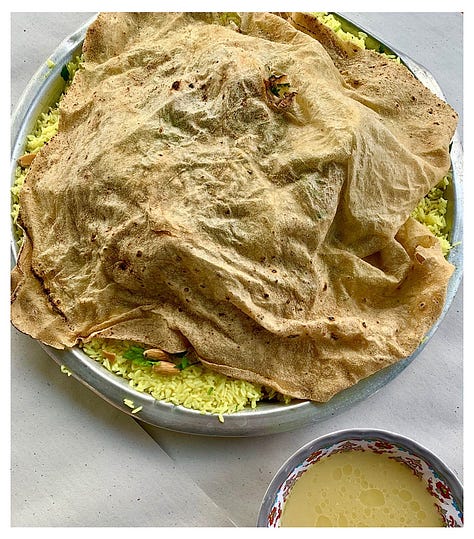


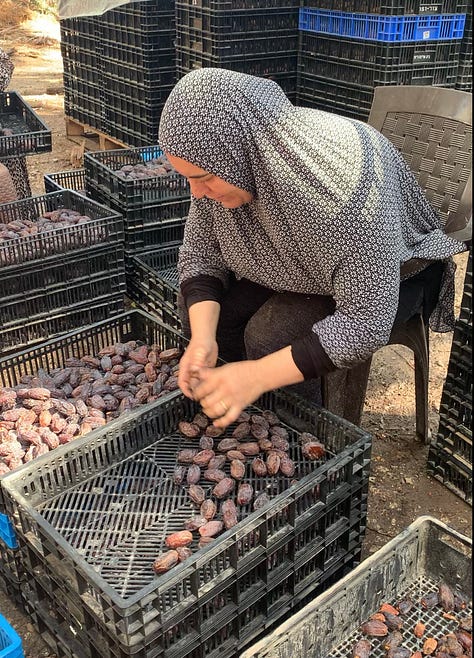


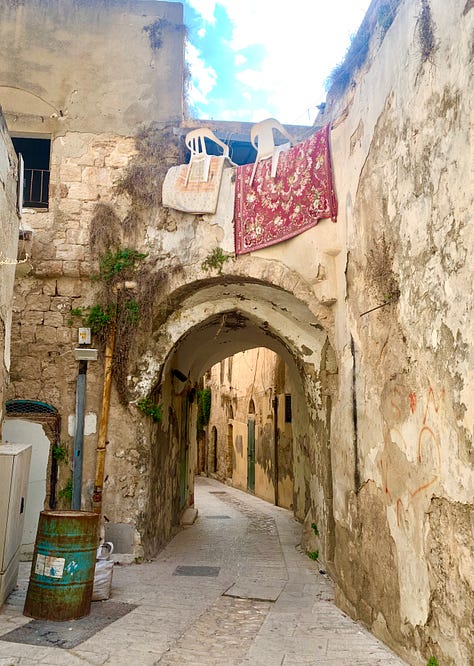

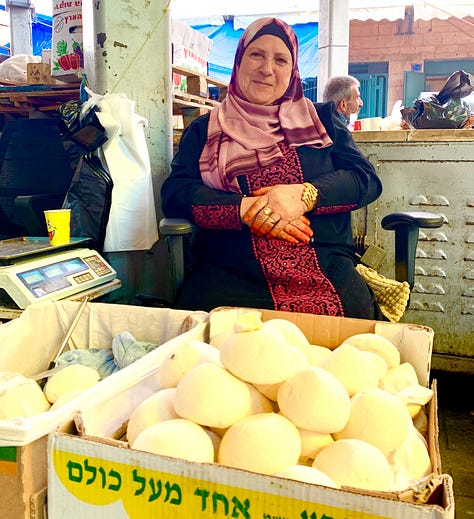
I’ve changed the names of the people I spoke to to protect their identity and safety.






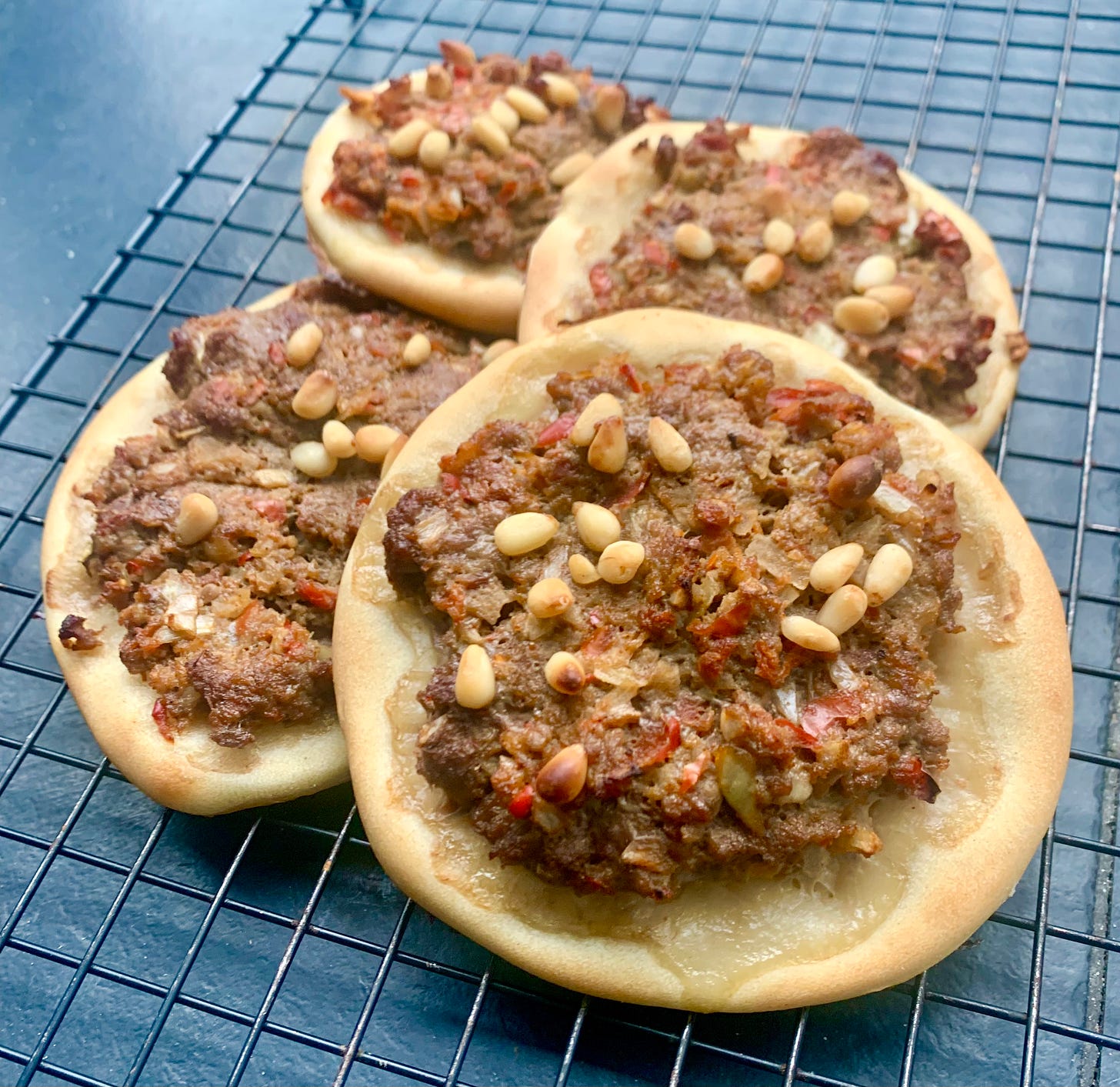
This is an extraordinary piece to writing that frankly should have been picked up by a Sunday Supplement. Such an important reminder that at the heart of the Palestine dispute there are everyday families cooking food for their children and every night they go to bed dreaming of obtaining the most basic human rights like running water or electricity. The best they can dream of is not to be woken by people demolishing their homes in the night by the name of another God.
Thank you for writing this.
Thank you for ‘seeing’ us.
As an Australian with Palestinian heritage, you made we weep reading your beautiful article.
I was searching for a recipe to recreate something for my Mama!
We Palestinians are not a shadow of how we are portrayed in western media.
Resilient and ever hopeful of freedom in the daily face of oppression.
Stories such as yours make our hearts beat with pride. God bless you!
Khristina x